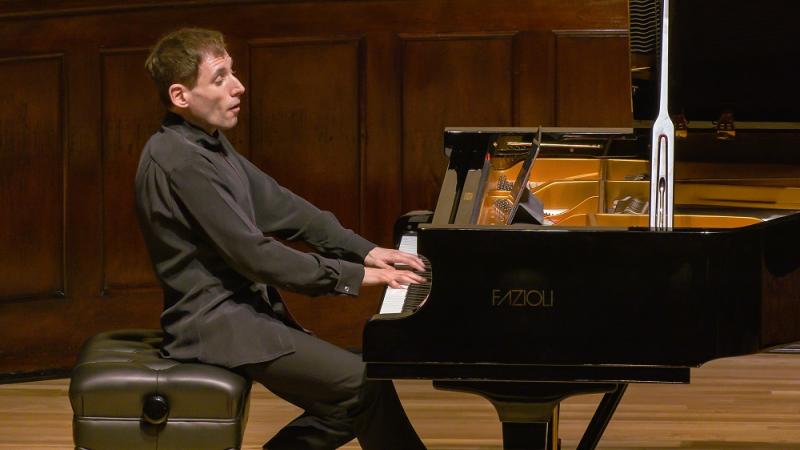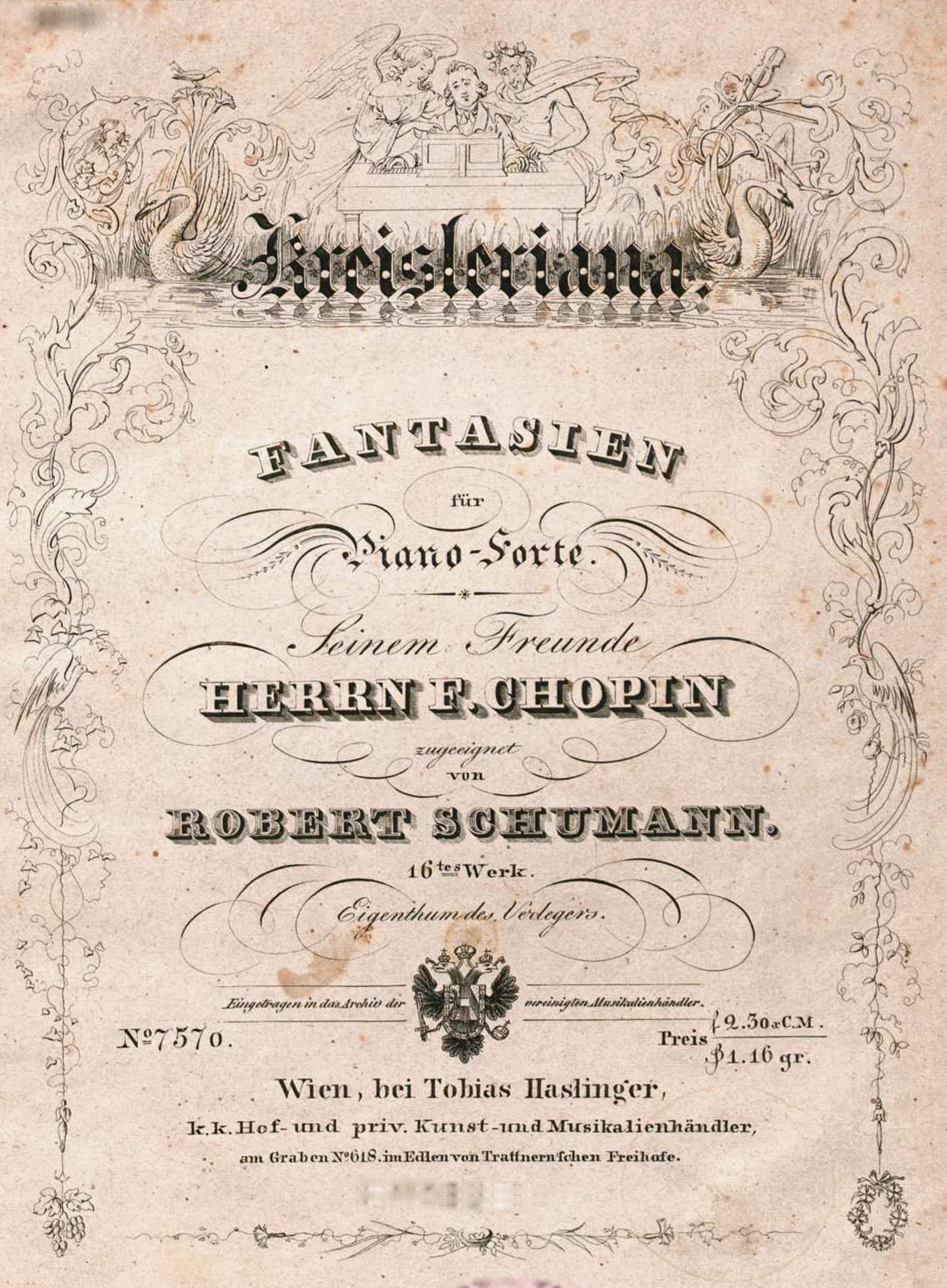Boris Giltburg, Wigmore Hall review - epic heaven and hell | reviews, news & interviews
Boris Giltburg, Wigmore Hall review - epic heaven and hell
Boris Giltburg, Wigmore Hall review - epic heaven and hell
Scriabin, Schumann and Chopin at their most chameleonic

With rapid, sleight-of-hand flicks between calm assurance and demonic agitation, Boris Giltburg turned in a coherent and epic recital that won’t be surpassed in 2024. Most pianists would quake simply at the thought of performing the four Chopin Scherzos in sequence; Giltburg set them up with phenomenal insights into Scriabin and Schumann.
He went in deep with perfect space around the noble beginnings of Scriabin’s relatively early (1890s) Second Sonata, that side of the composer very much, in Boris Pasternak’s words, “as tranquil and lucent as God resting from his labours on the seventh day”. The turbulent sequel in the two-movement work seems like a lesser being, but Giltburg’s evenness at high speed set the tone for the evening’s many transcendental whirls. It certainly connected with the first of Schumann’s Kreisleriana.
 I’ve always been transfixed by the contrasting nobility of the second’s main idea, perhaps at the expense of what follows, and it’s not always been easy to make sense of Schumann’s homage to Hoffmann’s variegated Kapellmeister Kreisler (perhaps if we knew more of the exact programme, one would, more readily). But having conducted the space between those numbers so eloquently, and picking up the change of mood with profound musicality every time, Giltburg never let the attention slip, with constant surprises (especially the harmonized bass treatment of the romantic turn in the fourth piece). For some, this will have been too extreme, but what is Schumann, especially in this amazing carnival of changing temperaments, if not that?
I’ve always been transfixed by the contrasting nobility of the second’s main idea, perhaps at the expense of what follows, and it’s not always been easy to make sense of Schumann’s homage to Hoffmann’s variegated Kapellmeister Kreisler (perhaps if we knew more of the exact programme, one would, more readily). But having conducted the space between those numbers so eloquently, and picking up the change of mood with profound musicality every time, Giltburg never let the attention slip, with constant surprises (especially the harmonized bass treatment of the romantic turn in the fourth piece). For some, this will have been too extreme, but what is Schumann, especially in this amazing carnival of changing temperaments, if not that?
One could have left deeply nourished by this first half. But the Chopin carried us, at times, even higher. Unlike the four Ballades, which can be played more or less continuously (as indeed Giltburg performed them in February 2023), each Scherzo demands applause; a “wow” from the gentleman in front of me at the end of the first, so Mephistophelian in its outer portions that it hit one in the gut, seemed likely to be followed by reverent silence, but Giltburg stood, not to solicit a bigger response but because it made sense. There was still a real progress from darkness to light across the course of the four, spanning a decade of Chopin’s short but rich musical life.
High speeds could have meant callow virtuosity, but for me this pianist always gives the right space when needed. Intimations of heaven come in the chorale theme of the third scherzo, the one most of us know less well, flights of angels descending to meet it; no hint of potential Lisztian tinselliness here. And the fourth nobly sealed the deal, Giltburg's chosen Fazioli piano helping with the full rainbow of colours (and none of the twang on sustaining-pedal release you too often get on the house Steinways). After all that grandeur, though, we needed something relatively simple, and it was to a reverent hall loud in the intensity of its silence that Giltburg gave the perfect, if unconnected, encore of Debussy’s “Clair de lune”.
Watch Boris Giltburg's previous Chopin-plus recital at the Wigmore Hall in December 2023
rating
Explore topics
Share this article
The future of Arts Journalism
You can stop theartsdesk.com closing!
We urgently need financing to survive. Our fundraising drive has thus far raised £49,000 but we need to reach £100,000 or we will be forced to close. Please contribute here: https://gofund.me/c3f6033d
And if you can forward this information to anyone who might assist, we’d be grateful.

Subscribe to theartsdesk.com
Thank you for continuing to read our work on theartsdesk.com. For unlimited access to every article in its entirety, including our archive of more than 15,000 pieces, we're asking for £5 per month or £40 per year. We feel it's a very good deal, and hope you do too.
To take a subscription now simply click here.
And if you're looking for that extra gift for a friend or family member, why not treat them to a theartsdesk.com gift subscription?
more Classical music
 First Person: clarinettist Oliver Pashley on the new horizons of The Hermes Experiment's latest album
Compositions by members of this unusual quartet feature for the first time
First Person: clarinettist Oliver Pashley on the new horizons of The Hermes Experiment's latest album
Compositions by members of this unusual quartet feature for the first time
 Gesualdo Passione, Les Arts Florissants, Amala Dior Company, Barbican review - inspired collaboration excavates the music's humanity
At times it was like watching an anarchic religious procession
Gesualdo Passione, Les Arts Florissants, Amala Dior Company, Barbican review - inspired collaboration excavates the music's humanity
At times it was like watching an anarchic religious procession
 Classical CDs: Camels, concrete and cabaret
An influential American composer's 90th birthday box, plus British piano concertos and a father-and-son duo
Classical CDs: Camels, concrete and cabaret
An influential American composer's 90th birthday box, plus British piano concertos and a father-and-son duo
 Cockerham, Manchester Camerata, Sheen, Martin Harris Centre, Manchester review - re-enacting the dawn of modernism
Two UK premieres added to three miniatures from a seminal event of January 1914
Cockerham, Manchester Camerata, Sheen, Martin Harris Centre, Manchester review - re-enacting the dawn of modernism
Two UK premieres added to three miniatures from a seminal event of January 1914
 Kempf, Brno Philharmonic, Davies, Bridgewater Hall, Manchester review - European tradition meets American jazz
Bouncing Czechs enjoy their Gershwin and Brubeck alongside Janáček and Dvořák
Kempf, Brno Philharmonic, Davies, Bridgewater Hall, Manchester review - European tradition meets American jazz
Bouncing Czechs enjoy their Gershwin and Brubeck alongside Janáček and Dvořák
 Solomon, OAE, Butt, QEH review - daft Biblical whitewashing with great choruses
Even a top soprano and mezzo can’t make this Handel paean wholly convincing
Solomon, OAE, Butt, QEH review - daft Biblical whitewashing with great choruses
Even a top soprano and mezzo can’t make this Handel paean wholly convincing
 Two-Piano Gala, Kings Place review - shining constellations
London Piano Festival curators and illustrious friends entertain and enlighten
Two-Piano Gala, Kings Place review - shining constellations
London Piano Festival curators and illustrious friends entertain and enlighten
 Echo Vocal Ensemble, Latto, Union Chapel review - eclectic choral programme garlanded with dance
Beautiful singing at the heart of an imaginative and stylistically varied concert
Echo Vocal Ensemble, Latto, Union Chapel review - eclectic choral programme garlanded with dance
Beautiful singing at the heart of an imaginative and stylistically varied concert
 Scott, Irish Baroque Orchestra, Whelan, RIAM, Dublin review - towards a Mozart masterpiece
Characteristic joy and enlightenment from this team, but a valveless horn brings problems
Scott, Irish Baroque Orchestra, Whelan, RIAM, Dublin review - towards a Mozart masterpiece
Characteristic joy and enlightenment from this team, but a valveless horn brings problems
 Classical CDs: Voice flutes, flugelhorns and froth
Baroque sonatas, English orchestral music and an emotionally-charged vocal recital
Classical CDs: Voice flutes, flugelhorns and froth
Baroque sonatas, English orchestral music and an emotionally-charged vocal recital
 Kanneh-Mason, Britten Sinfonia, Shave, Milton Court - a grin and a big beaming smile
A pair of striking contemporary pieces alongside two old favourites
Kanneh-Mason, Britten Sinfonia, Shave, Milton Court - a grin and a big beaming smile
A pair of striking contemporary pieces alongside two old favourites

Add comment